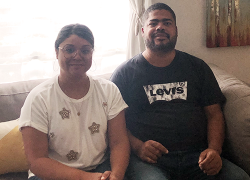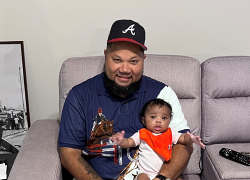The Family and Medical Leave Act (FMLA) has been the cornerstone of the Department of Labor’s efforts to promote work-life balance since it became law in 1993. The success of the law over the last 30 years is reflected in the stories of the workers who have exercised their rights to take job-protected leave to care for themselves and their family members.

One of those stories comes from Candice Gardner, a local government employee in Alabama. She recently contacted our Wage and Hour Division office in Birmingham to file an FMLA complaint. She requested and took unpaid leave, knowing that she was covered by the FMLA – but when her leave was up, her employer refused to reinstate her, effectively cancelling her income and health insurance. Gardner was shocked – and soon her bills began piling up.
“I couldn’t afford to go on family trips, and I couldn’t buy all the groceries my daughters and I needed,” said Gardner. “I cried and prayed a lot. I credit my faith in God and support from my family and fiancé for getting me through that difficult time.”
Aware of a potential FMLA violation, we decided to open an investigation.
After we examined the facts of the case, the employer admitted that Gardner’s medical restrictions did not prevent her from doing her job. The employer gave Gardner her job back and was required to pay her more than $42,000, including back wages, medical expenses and other expenses incurred while the employer refused to reinstate her. Additionally, her sick leave and annual leave accounts were restored for the time she was denied the opportunity to work.
Like so many workers over the past three decades, Gardner was glad that the FMLA provided the job protection she needed while she took care of her health. She was also thankful there was an enforcement agency committed to standing up for her rights.
“A million thanks for your hard work and dedication to justice,” Gardner said. “You didn’t give up on helping me and I’m forever grateful. Keep doing what you’re doing – you’re making a difference in people’s lives.”
The FMLA provides more than just time off and job-restoration rights for eligible workers. It also provides protection against retaliation and continued access to employer-provided benefits, such as health insurance. Over the past 30 years, we’ve helped 13,000 workers who were denied FMLA leave by their employers, 18,000 workers who were unjustly terminated and 1,000 workers whose health benefits were not maintained as required by the law.
As we celebrate the FMLA’s achievements during National Work and Family Month, we also recognize there is much more to do to ensure workers can exercise their rights to job-protected leave in the future. Unfortunately, too many workers who have the right to job-protected leave don’t take it when they need it because they’re unaware of their rights or they fear being treated differently at work if they request leave.
Every day, workers across America balance the demands of the workplace, the needs of their families and their own health. We encourage them to contact us at 1-866-487-9243 with any questions or concerns about their FMLA rights. We answer calls confidentially and we can communicate in more than 200 languages.
Juan Coria is the Southeast regional administrator for the Department of Labor's Wage and Hour Division. Follow the division on Twitter/X at @WHD_DOL and on LinkedIn.

 U.S. Department of Labor Blog
U.S. Department of Labor Blog





